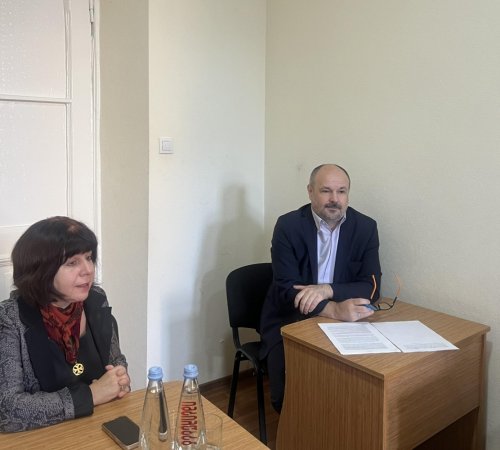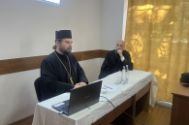Today, November 6, 2023, within
the framework of Erasmus+ exchange program, Tbilisi Theological
Academy and Seminary has been visited by the member of the Holy
Synod of the Orthodox Church of Poland, Professor of the Warsaw
Academy of Christian Theology, Professor of the Warsaw Academy of
Christian Theology, Bishop Endrew (Borkowski) and Professor of
Warsaw Academy of Christian Theology, Dean of the Faculty of
Theology - Jerzy Ostapchuk.
At the lecture, the Professor of
Warsaw Academy of Christian Theology, Bishop Endrew
(Borkowski) spoke at length about the history of the Orthodox
Church of Poland which developed against the background of intense
political and religious conflicts in which the world was plunged in
the 16th century. He noted that in the 16th century, a great
controversy arose within the Catholic Church of Poland between the
Catholics and the representatives of the newly formed Protestant
direction. As a counterweight to them, the Orthodox Church of
Poland formed brotherhoods to strengthen the Orthodox faith. To
extend help to them, Patriarch Jeremias of Constantinople (the 16th
century) sent Metropolitan Arseny to Poland, who, according to
Byzantine educational tradition, founded Orthodox schools in Poland
and compiled a text-book of Slavic-Greek grammar. The labor of
Metropolitan Arseny and achievements in his missionary work created
a solid foundation for the strength and unity of the Orthodox
Church of Poland. For this great contribution, the Church of Poland
canonized Metropolitan Arseny as a saint. At the close of the 16th
century, the Orthodox Church of Poland faced a grave threat - a
union (an agreement on unification) was concluded with the Catholic
Church. The political situation in which the State of Poland found
itself at that time forced it to participate in this union. The
speaker reviewed broadly the historical backdrop, he spoke about
the difficulties, persecution and challenges faced by the Orthodox
Church of Poland. In order to protect and strengthen Orthodoxy, the
Patriarch of Constantinople designated Archdeacon Nicephorus as
Exarch to the Polish Church. The latter was a highly educated
person with a deep knowledge of theology; at the same time, he was
an excellent diplomat. Bishop Endrew spoke extensively about the
life, activities and martyrdom of Exarch Nicephorus. He noted that
the ministry of Saint Exarch Nicephorus paved the way for a new era
of Orthodoxy in Poland. Because of his merits and martyrdom, the
Church of Greece and the Church of Poland canonized him as a
saint.
The topic of the lecture
delivered by the other speaker today, Jerzy Ostapczuk, was
theological education in Poland. He spoke about the two most
important dates in the history of Poland: the era of the
restoration of independence (in 1918) and acquisition of
autocephaly of the Orthodox Church (in 1924), and the state of
theological education in the subsequent period. As the Polish guest
stated, in 1918-1925 solely the seminary granted access to the
study of theological issues. In 1922, a temporary agreement was
made between the Orthodox Church and the state. Of course, that
agreement was related to the issues of education. Teaching was to
be conducted in the Polish language and the program was approved by
the state as well. However, from 1925, Orthodox theology was taught
at the University of Warsaw. The Faculty of Orthodox Theology
cooperated with its counterparts in the universities of Bucharest,
Sofia, Belgrade, and Paris. During the fifteen years of the
faculty’s existence, world-famous scientists taught at the
university; First of all, Archimandrite Grigol Peradze should be
mentioned here, who received his theological education in Poland,
then in Bern and Berlin. In 1951, a theological lyceum was founded,
which later was transformed into a seminary still functioning
today. In 1954, the Academy of Christian Theology (Catholic and
Lutheran) was founded in Warsaw, to which two years later the
Faculty of Orthodox Theology was added. Since then, the Orthodox
Church in Poland has had the opportunity to provide its clergy with
academic education in their homeland. At present, the faculty
admits students to the Bachelor’s, Master’s and doctoral levels.
The lectures of guests from Poland were attended by students and
professors of Tbilisi Theological Academy and Seminary, and both of
them were concluded with conversations of question-and-answer
format.
The lectures within the framework
of the exchange program will continue for three more days.






